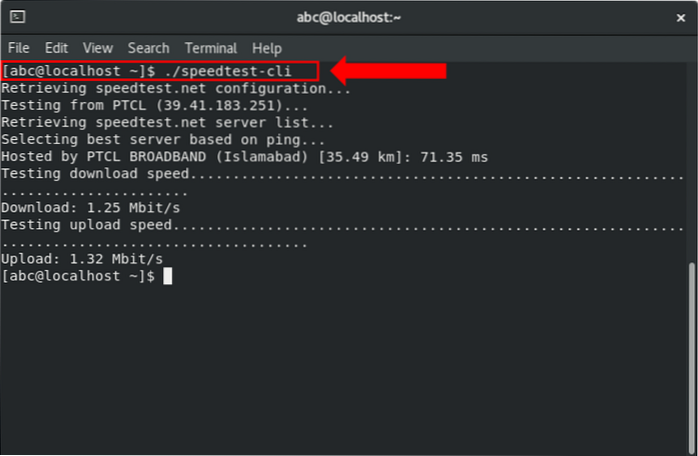Linux Server Malware and Rootkits Scanners
- Lynis. lynis. ...
- Chkrootkit. This system scanner is also characterized as a freeware and open-source project. ...
- Rkhunter. The scanner is also characterized as a freeware and open-source project. ...
- ClamAV. ClamAV Scan Report. ...
- LMD.
- What is the best rootkit removal tool?
- How do I check for malware on Linux?
- Is there malware for Linux?
- Is Rootkit a malware?
- How do I remove rootkit virus?
- Which tool is used to identify and delete rootkit?
- Does Linux need anti malware?
- Why Ubuntu is safe and not affected by viruses?
- Does ClamAV Scan for Linux viruses?
- Why is Linux a target for hackers?
- Why Linux has no virus?
- Can Linux get hacked?
What is the best rootkit removal tool?
It has a user-friendly graphical interface that is accessible for non-technical users.
- GMER. GMER is a rootkit scanner for experienced users. ...
- Kaspersky TDSSKiller. ...
- Malwarebytes Anti-Rootkit Beta. ...
- McAfee Rootkit Remover. ...
- Norton Power Eraser. ...
- Sophos Virus Removal Tool. ...
- Trend Micro Rootkit Buster.
How do I check for malware on Linux?
5 Tools to Scan a Linux Server for Malware and Rootkits
- Lynis – Security Auditing and Rootkit Scanner. Lynis is a free, open source, powerful and popular security auditing and scanning tool for Unix/Linux like operating systems. ...
- Rkhunter – A Linux Rootkit Scanners. ...
- ClamAV – Antivirus Software Toolkit. ...
- LMD – Linux Malware Detect.
Is there malware for Linux?
Linux malware includes viruses, Trojans, worms and other types of malware that affect the Linux operating system. Linux, Unix and other Unix-like computer operating systems are generally regarded as very well-protected against, but not immune to, computer viruses.
Is Rootkit a malware?
Rootkits are a type of malware designed to stay undetected on your computer. Cybercriminals use rootkits to remotely access and control your machine, burrowing deep into the system like a latched-on tick.
How do I remove rootkit virus?
How to remove rootkit malware. To clean up rootkits, you have several options. You can run the Windows Defender offline scan from inside Windows 10. Go to the Windows Defender Security Center, into Advanced scans and check the radius box to enable the Windows Defender offline scan.
Which tool is used to identify and delete rootkit?
Rootkit Remover is a standalone utility used to detect and remove complex rootkits and associated malware. Currently it can detect and remove ZeroAccess, Necurs and TDSS family of rootkits.
Does Linux need anti malware?
The core reason you don't need an antivirus on Linux is that very little Linux malware exists in the wild. Malware for Windows is extremely common. ... Whatever the reason, Linux malware isn't all over the Internet like Windows malware is. Using an antivirus is completely unnecessary for desktop Linux users.
Why Ubuntu is safe and not affected by viruses?
Viruses don't run Ubuntu platforms. ... Peoples writing virus for windows and other to Mac OS x, Not for Ubuntu… So Ubuntu do not get them in often. Ubuntu systems are inherently more secureGenerally, it is very hard to infect a hardend debian / gentoo system without asking for permission.
Does ClamAV Scan for Linux viruses?
Real time protection (Linux only). Our scanning daemon supports on-access scanning on modern versions of Linux, including the ability to block file access until a file has been scanned. ClamAV detects over 1 million viruses, worms and trojans, including Microsoft Office macro viruses, mobile malware, and other threats.
Why is Linux a target for hackers?
Linux is an extremely popular operating system for hackers. There are two main reasons behind this. First off, Linux's source code is freely available because it is an open source operating system. ... This type of Linux hacking is done in order to gain unauthorized access to systems and steal data.
Why Linux has no virus?
Some people believes that Linux still has a minimal usages share, and a Malware is aimed for mass destruction. No programmer will give his valuable time, to code day and night for such group and hence Linux is known to have little or no viruses.
Can Linux get hacked?
The clear answer is YES. There are viruses, trojans, worms, and other types of malware that affect the Linux operating system but not many. Very few viruses are for Linux and most are not of that high quality, Windows-like viruses that can cause doom for you.
 Linuxteaching
Linuxteaching



